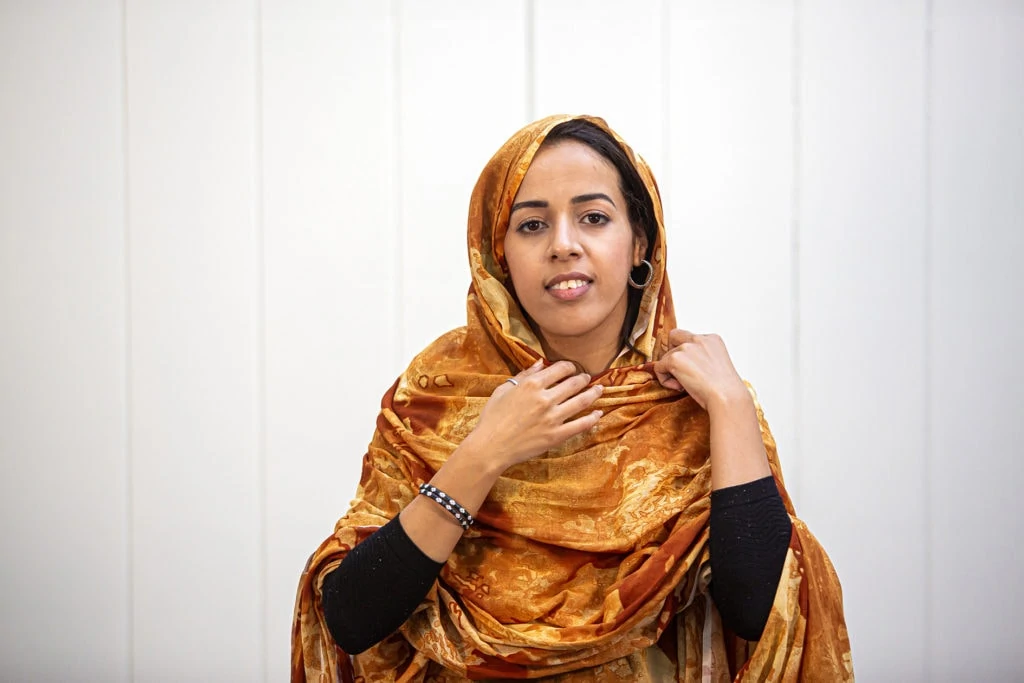The Western Sahara conflict is a continuing catastrophe for the population of the Sahrauis. Since 1975, the Moroccan regime has illegally ruled over these people and their homeland in North West Africa. terre des hommes schweiz has been committed for many years to the private, political and economic self-determination of the Sahrauis. The development organisation successfully lobbied for the young Sahraui, Laila Fakhouri, to be awarded the Human Rights Prize of the City of Weimar on 10 December today.
On December 10, the International Human Rights Day, Laila Fakhouri will personally receive the Human Rights Award of the City of Weimar. The development organisation terre des hommes schweiz, based in Basel, and Terre des Hommes Deutschland e.V. had nominated the human rights activist, a Sahraui from the Western Sahara, for this honour.
"Laila Fakhouri is a clever and courageous young woman," says Sylvia Valentin, Western Sahara expert at terre des hommes schweiz, who will accompany the prizewinner to Weimar and give the laudatory speech there. "She is one of many voices who undauntedly and peacefully stands up for the right to self-determination of the Sahrauis and draws the attention of the world public to the forgotten Western Sahara conflict," says Sylvia Valentin.
Laila Fakhouri: "Standing up for the rights of my people
Laila Fakhouri, born in 1994, belongs to the Sahrawi minority in Morocco. She too has experienced discrimination, arbitrariness and violence by the occupying power since childhood. She studied English and works as a trial observer, translator and mediator in an international context. She risks her life for her peaceful struggle for self-determination, human dignity, welfare and security of the Sahrauis.
"I feel a moral obligation to stand up for my people in public", says Laila Fakhouri: "I want to make sure that our voices are heard by as many people in the world as possible". As a human rights activist, woman and Sahraui, she is exposed to multiple threats.
Western Sahara, the "last colony in Africa"
"The human rights of the Sahrawi people will be trampled underfoot for decades and with the occupation of Western Sahara, the Moroccan regime is violating international law," stresses Sylvia Valentin of terre des hommes switzerland.
The illegal occupation of Western Sahara by Morocco after the withdrawal of the former colonial power Spain in 1975 still exists today - and this despite the fact that the Sahrauis were assured in the ceasefire agreement of 1991 that they could vote in a referendum on the future of their homeland. "Western Sahara is the last colony in Africa," criticizes Sylvia Valentin. "The international legal situation is clear, but the political will to implement it is lacking."
terre des hommes switzerland and the sahrauis
terre des hommes schweiz has been committed for many years to helping young people and their families in the Smara refugee camp in the western Algerian desert. Around 174,000 Sahrauis live there in five camps, completely dependent on international aid organisations. Together with the Sahrawi youth association UJSARIO, the Swiss development organisation supports young people in learning skills such as cooking, sewing, IT and foreign languages. In the youth centres run by UJSARIO in the camp, games and sports events are offered and there are information events on topics such as sexual health or the Western Sahara conflict. "We support young people in Western Sahara in their right to self-determination," summarizes Sylvia Valentin.
In addition to the project and information work for young people and their families, terre des hommes schweiz is committed to the political and economic self-determination of the Sahrauis. The non-profit organisation therefore criticises the actions of foreign, including Swiss, companies in the occupied Western Sahara and demands that such economic activities on the ground only take place with the consent of the official representation of the Sahrauis.
terre des hommes schweiz is the Swiss contact point of the international network WSRW (Western Sahara Resource Watch).


